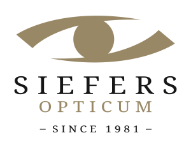Is your frame still fine, but would you like to change your lenses? Or are you ready for your first pair of glasses and have no idea what you need? At Siefers Opticum you can be sure that you will always buy the best quality lenses.
Made of glass or plastic, from all glass manufacturers, including Essilor (of the famous Varilux), Rodenstock or Zeiss. Single vision or varifocal lenses, non-reflecting or self-tinting lenses; whatever your wishes and needs, you will get the best, independent advice from our family business. Unlike many opticians, Siefers Opticum has no standing arrangements with specific lens suppliers. We supply you with the lenses you want and that suit you best. Naturally, we prefer to work with the top suppliers in the field of spectacle lenses such as Zeiss, Rodenstock and Essilor (of the famous Varilux lenses).


